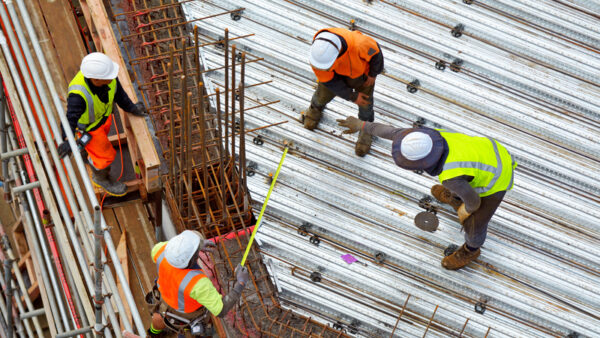
When you hear the term “artificial intelligence” (AI), what’s the first thing that comes to mind?
Perhaps it’s the rise of ChatGPT, or the thought of robots taking over from us.
No matter your stance on AI, it’s becoming a big part of our future and we’ll have to adapt.
The construction industry is one of the least digitalised industries and is at the very early stages of technology adoption.
But quite a few people who work in the industry say they’re eager for it.
According to recruitment agency, Randstad, 46% of those surveyed believe upskilling in technological skills like AI will be essential in their role over the next five years.
Considering the construction industry contributes 6% of the UK’s GDP, practising better data utilisation would increase productivity and help contribute to more economic growth. But where do we start?
Data, data, everywhere
From the moment a building is first pitched by a client to well after practical completion, the entire process requires huge amounts of data.
Lengthy contracts, rounds of architectural drawings and designs, thousands of tender submissions, supplier quotes (RFQs), scope of works, and bills of material quantities: the list is endless.
Within this mass of information lies the “gold”, the opportunity to identify areas for improvement at all project stages.
AI-driven data analysis can help us understand why a project succeeded or failed, and not just data from the project under scrutiny, but data from past projects.
At E1, we’ve been using AI-like pattern recognition for years. In our case, to help subcontractors find specific keywords in page-heavy documents and to auto-recommend superseding documents so that only the most relevant and up-to-date information is being referred to.
Done properly, it can lead us to a future where we work faster and smarter whilst creating safer buildings in the process.
Human experience remains important
One of the biggest misconceptions surrounding this type of tech is that it’s going to replace jobs.
Construction is fundamentally a human-first profession, requiring years of on-the-job knowledge and experience. At its heart, the sector runs on relationships, not stats and figures.
If you’re doing your job in construction solo behind the keyboard, chances are you’re not doing it right. Every building, from inception to completion, results from interpersonal relationships and good communication, something AI cannot replicate.
For those still unsure, we need to remember that the likes of Siri or ChatGPT haven’t been designed to replace, but rather improve our daily functions.
Get in early
Getting on board with innovation and tapping into AI’s potential could shake up the construction game, making it way more efficient, sustainable, and teamwork-friendly than ever. We could automate data collection, analysis, and decision-making like never before, freeing up time for teams to tackle the really important stuff.
And it’s not just about making life easier for workers: bosses could keep their top talent happy and draw in new prospects to the industry. Done right, this shift could open up opportunities for career growth and job satisfaction.
With AI-powered systems in play, workers could save time, slash errors, and wrap up projects quicker.
We have to get past the hurdle of fully embracing tech, not shying away from it. That means getting comfy with digital tools daily and doubling down on training where necessary.
AI will eventually be as natural to the construction industry as a hard hat, but those who jump on the bandwagon now are set to cash in big time.
- Simon Herod is international lead at E1






